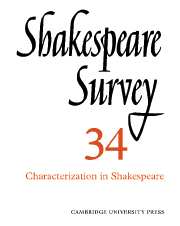Book contents
- Frontmatter
- Shakespeare’s Open Secret
- The Emergence of Character Criticism, 1774–1800
- Society and the Individual in Shakespeare’s Conception of Character
- Realistic Convention and Conventional Realism in Shakespeare
- On Expectation and Surprise: Shakespeare’s Construction of Character
- Shakespeare and the Ventriloquists
- The Rhetoric of Character Construction: Othello
- Characterizing Coriolanus
- The Ironic Reading of The Rape of Lucrece and the Problem of External Evidence
- The Unity of Romeo and Juliet
- No Abuse: The Prince and Falstaff in the Tavern Scenes of Henry IV
- Twelfth Night: The Experience of the Audience
- Plays and Playing in Twelfth Night
- Sceptical Visions: Shakespeare’s Tragedies and Jonson’s Comedies
- Shakespeare in Performance, 1980
- The Year's Contributions to Shakespearian Study 1 Critical Studies
- 2 Shakespeare’s Life, Times and Stage
- 3 Textual Studies
- Index
- Plate Section
The Unity of Romeo and Juliet
Published online by Cambridge University Press: 28 March 2007
- Frontmatter
- Shakespeare’s Open Secret
- The Emergence of Character Criticism, 1774–1800
- Society and the Individual in Shakespeare’s Conception of Character
- Realistic Convention and Conventional Realism in Shakespeare
- On Expectation and Surprise: Shakespeare’s Construction of Character
- Shakespeare and the Ventriloquists
- The Rhetoric of Character Construction: Othello
- Characterizing Coriolanus
- The Ironic Reading of The Rape of Lucrece and the Problem of External Evidence
- The Unity of Romeo and Juliet
- No Abuse: The Prince and Falstaff in the Tavern Scenes of Henry IV
- Twelfth Night: The Experience of the Audience
- Plays and Playing in Twelfth Night
- Sceptical Visions: Shakespeare’s Tragedies and Jonson’s Comedies
- Shakespeare in Performance, 1980
- The Year's Contributions to Shakespearian Study 1 Critical Studies
- 2 Shakespeare’s Life, Times and Stage
- 3 Textual Studies
- Index
- Plate Section
Summary
Dryden thought Mercutio was Shakespeare’s rather ill-bred idea of a Gentleman. Coleridge thought he was a man possessing ‘all the elements of a Poet’. Between them they may be taken to establish the two poles of preference, the one for the realistic, the other for the poetic, between which criticism has since oscillated. Many critics have settled the dilemma by sacrificing the play, for example Duthie, who agreed with Charlton that ‘as a pattern of the idea of tragedy [the play] is a failure’. Such critics excuse it as prentice work and concentrate on deciding whether it is trying to be mainly a medieval tragedy of the stars and Fortune, or a social tragedy, or a tragedy of character. The most sophisticated attempt to reconcile the poetry to the realism in defence of the play’s unity is by Nicholas Brooke, who argues: ‘The play depends, then, very much on formal patterning, like a sonnet; but explored, criticized, and penetrated, so that the formal surface not only restrains but also reveals the inner experience.’ I say ‘sophisticated’, for the argument, brilliant and illuminating though it is, verges on the sophistical in the way it recruits the play’s poetry against itself and so, in the last resort, into the service of a kind of realism.
- Type
- Chapter
- Information
- Shakespeare Survey , pp. 93 - 104Publisher: Cambridge University PressPrint publication year: 1982
- 2
- Cited by

